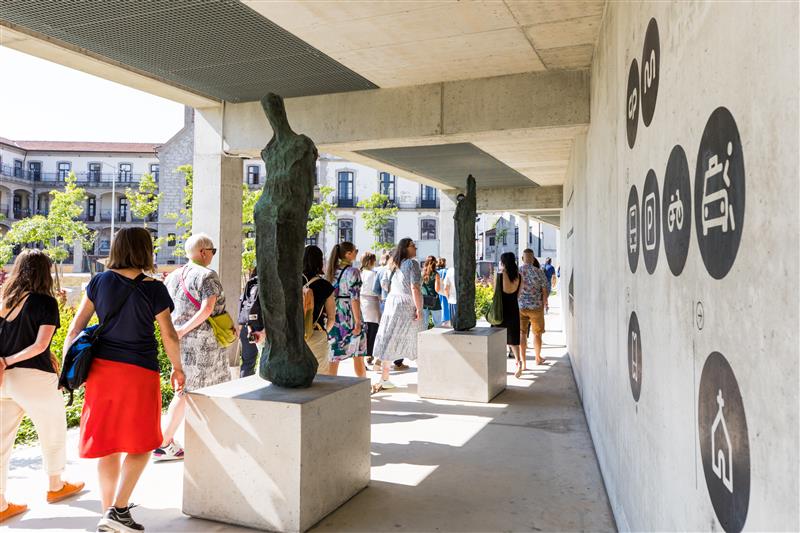Tecnologias inovadoras testadas em contexto europeu aumentam qualidade de vida de comunidades vulneráveis do Porto
Tecnologias inovadoras testadas em contexto europeu aumentam qualidade de vida de comunidades vulneráveis do Porto

O Porto foi uma das cidades líderes desta iniciativa europeia que permitiu testar soluções com impacto direto em comunidades vulneráveis. Foram 19 os projetos piloto implementados na cidade.
Um jogo de realidade virtual com Inteligência Artificial (IA) para apoiar terapias para crianças e adultos portadores de deficiência, um projeto que apoia a agricultura urbana em hortas comunitárias com sensores e IA, e uma tecnologia que visa diminuir a solidão de idosos que vivem sozinhos em bairros sociais de Campanhã, foram alguns dos projetos desenvolvidos na cidade do Porto, no âmbito do projeto europeu Communicity.
Os vários projetos foram apresentados hoje, quarta-feira, 2 de julho, num evento promovido pela Porto Digital para a apresentação oficial dos resultados do CommuniCity, uma iniciativa europeia pioneira de inovação urbana centrada no cidadão, para a criação de cidades mais inclusivas. A cidade do Porto foi uma das líderes do projeto (em associação com Helsínquia e Amesterdão) aqui implementado pelo Município do Porto com coordenação da Porto Digital, envolvendo centenas de participantes, entre residentes de bairros sociais, jovens, idosos, técnicos municipais e investigadores.
“Através deste laboratório vivo que tem sido o projeto Communicity, conseguimos conectar os inovadores diretamente às comunidades que pretendem servir e isso ficou bem patente nos 19 projetos-piloto implementados no Porto. Seja desenvolvendo ferramentas para ajudar os nossos cidadãos a gerir o consumo de energia, apoiando os idosos com novas tecnologias ou melhorando as competências digitais, o processo foi sempre o mesmo: começar com as pessoas. Ouvir as suas necessidades. Construir com elas, não apenas para elas. Desta forma, estamos a contribuir para uma cidade mais saudável, mais inclusiva e mais sustentável”, afirmou Filipe Araújo, vice-presidente da Câmara Municipal do Porto e também vereador com os pelouros da Inovação e Transição Digital e de Finanças, Emprego e Empreendedorismo.
A cidade do Porto foi uma das líderes do projeto, tendo implementado 19 projetos piloto, que cobriram áreas como a inclusão digital, sustentabilidade, saúde, educação e participação cívica. Estes projetos envolveram ativamente cidadãos, startups, universidades, organizações locais e entidades públicas e o município. O objetivo foi o de cocriar soluções para responder às necessidades reais das comunidades marginalizadas, com vista a melhorar a qualidade de vida
dos cidadãos. O Porto participou também em dois pilotos transfronteiriços, focados em planeamento urbano participativo e avaliação de competências digitais.
Durante 36 meses, o projeto Communicity envolveu 19 cidades, de 12 países europeus, e permitiu a implementação de 101 projetos piloto através de 3 rondas de Open Calls, com 72 equipas selecionadas, destacando-se por promover uma abordagem inovadora de “test-before-invest” (testar antes de investir), incentivando a cocriação de soluções digitais para desafios identificados nas comunidades mais desfavorecidas.
Karl Filip Coenegrachts, responsável pela coordenação do projeto a nível europeu, afirmou, na ocasião, que “este projeto resultou num conjunto de soluções reais, para problemas reais das comunidades marginalizadas. Durante estes três anos foi evidente que a colaboração entre os diferentes parceiros e as cidades é crucial para a cocriação de soluções que funcionam e que fornecem valor. O trabalho desenvolvido pelo Porto, através da Porto Digital, foi muito importante - é uma cidade que conhece bem as necessidades das suas comunidades e onde foi muito fácil colocar os vários projetos pilotos em prática”.
Alguns dos projetos piloto mais relevantes desenvolvidos no Porto, no âmbito do Communicity:
AI-VR Terapia Infantil: Jogo de realidade virtual com IA para apoiar terapias com crianças portadoras de deficiência.
Clamigo: Apoio à agricultura urbana e hortas comunitárias com sensores e plataforma baseada em IA para ajudar as pessoas com baixa literacia digital a organizar as suas hortas.
Minus-E: Plataforma para facilitar a monitorização e a gestão do consumo e produção energética e aumentar a literacia digital e energética em bairros sociais.
Porto Sense: Monitorização do conforto térmico em habitação social com envolvimento direto dos moradores.
EduConnect: Tecnologia para reduzir o abandono escolar com soluções baseadas em IA adaptadas a cada aluno.
JuniCoders: Iniciação à programação e à robótica para crianças do 3.º e 4.º ano com ferramentas lúdicas.
PortoPilot: Diminuir a solidão de idosos que vivem sozinhos em bairros sociais, através da tecnologia. Envolve a realização de inquéritos para aferir as necessidades de cada casa e a seleção de tecnologia adequada com base nessas necessidades.
Plataforma de Vídeo Interativa, desenvolvida em colaboração com o Instituto do Emprego e Formação Profissional (IEFP) para apoiar os desempregados de longa duração, ajudando-os a reintegrar-se no mercado de trabalho.
Porto Sense, projeto implementado pelo Município do Porto com coordenação da Porto Digital, em colaboração com a Domus Social, para monitorização do conforto térmico em habitação social que contou com o envolvimento direto dos moradores.
Mais informação em https://communicity-project.eu/